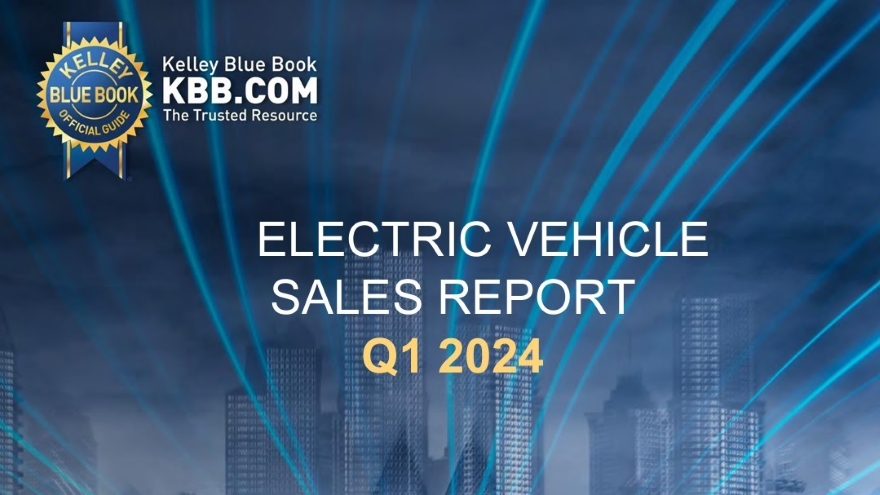Report shows EV sales growth slowing considerably

Image courtesy of Cox Automotive.
By subscribing, you agree to receive communications from Auto Remarketing and our partners in accordance with our Privacy Policy. We may share your information with select partners and sponsors who may contact you about their products and services. You may unsubscribe at any time.
Sales of electric vehicles continue to grow in the U.S., but a new report shows the pace of that growth has slowed considerably.
According to sales data analyzed by Kelley Blue Book in its Q1 2024 Electric Vehicle Sales Report, Americans purchased 268,909 new EVs in the first quarter. That’s up 2.6% year-over-year, but down 15.2% from the Q4 2023.
Stephanie Valdez Streaty, director of industry insights for KBB’s parent company, Cox Automotive, said that represents the first quarter-over-quarter drop in EV sales since the second quarter of 2020 – the beginning of the COVID pandemic shutdowns.
The year-over-year increase was also much smaller than those of the past two years. In Q1 2023, EV sales volume rose 46.4% from the previous year and 15.5% quarter-over-quarter. In 2022, first-quarter EV sales jumped 81.2% year-over-year and 20.4% from the previous quarter.
Cox Automotive analysts said the slowdown in EV sales growth was expected, as segment growth typically slows as volume increases.
That is best illustrated by Tesla, which has long dominated the EV market. According to KBB estimates, Tesla’s U.S. sales plummeted 13.3% year over year, a huge departure from its past double-digit gains.
Subscribe to Auto Remarketing to stay informed and stay ahead.
By subscribing, you agree to receive communications from Auto Remarketing and our partners in accordance with our Privacy Policy. We may share your information with select partners and sponsors who may contact you about their products and services. You may unsubscribe at any time.
As a result, KBB said, Tesla’s EV market share has dropped from 61.7% a year ago to 51.3%.
“As anticipated, Tesla’s sales took a hit, influencing the overall market dynamics,” Valdez Streaty said in a news release. “However, a few brands saw significant EV sales increases, achieving over 50% year-over-year growth.”
The KBB report showed nine brands — BMW, Cadillac, Ford, Hyundai, Kia, Lexus, Mercedes-Benz, Rivian and Vinfast — surpassed that 50% mark. For Cadillac and Mercedes, EVs now make up 15% or more of their brand’s total sales.
Cox said strong EV sales from luxury brands suggest the EV market remains luxury-driven. The success of Cadillac’s Lyriq fueled that brand’s 500% year-over-year increase in EV sales, while Mercedes and BMW recorded more than 60% growth.
On the other side of the price spectrum, the nation’s most affordable EV in the U.S. — the Chevrolet Bolt — has been removed from the market temporarily halted. KBB said Bolt sales fell 64.3% year-over-year in Q1 to just 7,040 when production stopped. A new version of the Bolt is expected to launch in 2025.
Among non-luxury brands, Ford’s EV sales soared 86.1% year-over-year to move it into second in volume behind Tesla.
Cox Automotive said overall EV sales volume has been supported by lower prices, with Tesla leading the way. Tesla’s Q1 average transaction price of $52,315 was down 13.5% year-over-year. The average transaction price among all new EVs fell 9% to $55,167.
That said, Cox’s analysis noted lower prices did not generate higher volume, and said the price cuts and increased incentives offered by many brands are signs of slowing demand.
In addition, the analysis said, EV leasing has more than doubled in the past year, now accounting for 27% of all new EV transactions, allowing many buyers to qualify for the full $7,500 tax incentive created by the Inflation Reduction Act.
All that said, Cox Automotive is forecasting another rise in U.S. EV sales in 2024, with EVs expected to reach a 10% market share by the end of the year.
“As noted in January, we are calling 2024, ‘The Year of More,’ ” Valdez Streaty said. “More new products, more incentives, more inventory, more leasing and more infrastructure will drive EV sales higher this year. Even so, we’ll continue to see ups and downs as the industry moves towards electrification.”


